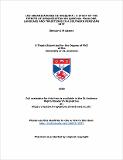Files in this item
Los urbanizadores de Arequipa : a study of the effects of urbanization on Quechua folklore, language and traditions in a southern Peruvian city
Item metadata
| dc.contributor.author | Adams, Stewart I. M. | |
| dc.coverage.spatial | 410 | en_US |
| dc.date.accessioned | 2011-07-27T14:54:42Z | |
| dc.date.available | 2011-07-27T14:54:42Z | |
| dc.date.issued | 1980 | |
| dc.identifier.uri | https://hdl.handle.net/10023/1937 | |
| dc.description.abstract | The thesis endeavours to assess the changes which have taken place, due to urbanization, in certain fundamental aspects of Quechua culture among migrants from the Southern Peruvian Sierra who have settled in the pueblos jóvenes, “shanty towns” of Arequipa, Peru. In 7 chapters, based on material taped from 45 Quechua informants, the thesis discusses the urban milieu, evidence for the continuance of a riddling tradition, a folk song tradition, and traditional Quechua belief systems in the city. The thesis also examines the linguistic aspect of Quechua in the urban environment, whether it still constitutes a functional means of communication, and whether the closer proximity to Spanish in the city has resulted in what might be classed as an urban dialect of Quechua. The thesis concludes that whereas Quechua immigrants to the city have been willing to adapt to city life in its more material aspects, in the more symbolic aspects of their culture, they have been less willing to change. Consequently, many features of Quechua culture appear, for the present, to be thriving in the city. Evidence for the survival of the symbolic aspects of Quechua culture are contained throughout the main body of the thesis in the Quechua transcriptions and English/Spanish translations of interviews given by informants, in the English translations of the riddles, in the synopses of the folktales narrated by the informants, and in the appendices, where the full Quechua transcriptions of some 32 folktales, 36 riddles and 24 songs are contained. The thesis maintains that the Quechua immigrants to Arequipa constitute a new subculture which looks to the city for material support, but which is still heavily based on Quechua linguistic and cultural values. There has been a weakening of Quechua language and cultural traits in the city as a result of urbanization, but there does not appear to be the wholesale adoption of “western” ways to the detriment of Indian language and culture as was once suspected. | en_US |
| dc.language.iso | en | en_US |
| dc.title | Los urbanizadores de Arequipa : a study of the effects of urbanization on Quechua folklore, language and traditions in a southern Peruvian city | en_US |
| dc.type | Thesis | en_US |
| dc.type.qualificationlevel | Doctoral | en_US |
| dc.type.qualificationname | PhD Doctor of Philosophy | en_US |
| dc.publisher.institution | The University of St Andrews | en_US |
This item appears in the following Collection(s)
Items in the St Andrews Research Repository are protected by copyright, with all rights reserved, unless otherwise indicated.

